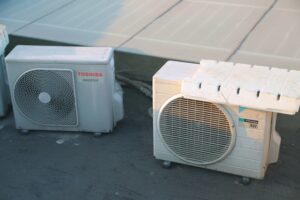If you’re considering a tankless water heater, you may be wondering if a gas tankless water heater requires electricity. The short answer is yes, it does. While gas heats the water, electricity is still needed to power the controls, sensors, and other internal components. According to the National Electrical Code, most tankless gas water heaters require a 15-ampere or 20-ampere 120-volt circuit to power the electric pilot light and control board.
When it comes to energy efficiency, tankless water heaters are a great option. They can provide hot water on demand, which means you’re not wasting energy heating water that you’re not using. Gas tankless water heaters are generally more energy efficient than electric tankless water heaters, although electric tankless water heaters can be more efficient in certain situations. At Excel Mechanical, we can help you determine which type of tankless water heater is the best option for your needs and budget. Get in touch to discuss your options.
Understanding Tankless Water Heaters
If you’re considering upgrading your water heating system, you may be wondering whether a tankless water heater is right for you. Tankless water heaters are known for their energy efficiency, compact size, and endless hot water supply. In this section, you’ll learn how tankless water heaters work and the differences between gas and electric models.
How Tankless Water Heaters Work
Unlike traditional storage tank water heaters, tankless water heaters heat water on demand. When you turn on a hot water tap, cold water flows through a heat exchanger, where it is heated by either a gas burner or an electric element. The hot water then flows out of the tap and into your shower, sink, or appliance.
Tankless water heaters are designed to handle a specific flow rate, measured in gallons per minute (GPM). If the flow rate exceeds the heater’s capacity, the water will not be heated to the desired temperature. It’s important to choose a tankless water heater with the right flow rate for your household’s needs.
Gas vs. Electric Tankless Water Heaters
Gas tankless water heaters require a gas line and venting system, while electric tankless water heaters require a dedicated electrical circuit. While gas tankless water heaters have higher power requirements, they are often more energy-efficient than electric models. Gas tankless water heaters also tend to have a longer lifespan than electric models.
When deciding between gas and electric tankless water heaters, it’s important to consider your household’s hot water needs, budget, and available energy sources.
Energy and Efficiency Considerations
When it comes to energy and efficiency considerations, gas tankless water heaters have a lot to offer. Here are some important things to keep in mind:
Energy Savings with Tankless Units
One of the biggest advantages of gas tankless water heaters is their ability to save energy. Unlike traditional tank-style water heaters, which constantly heat and reheat a large amount of water, tankless units only heat water as it’s needed. This means that they use significantly less energy overall, which can lead to lower energy costs over time.
Efficiency Ratings and Certifications
When shopping for a gas tankless water heater, it’s important to pay attention to efficiency ratings and certifications. The ENERGY STAR certification, for example, is a good indicator that a particular unit is energy efficient and can help you save money on your utility bills. Other certifications to look for include the Uniform Energy Factor (UEF) and the Energy Factor (EF).
Electrical Requirements for Gas Tankless Water Heaters
If you’re considering installing a gas tankless water heater, you may be wondering about the electrical requirements for these units. While gas is used to heat the water, electricity is still required to power the electronic ignition, control panel, sensors, and other components.
Importance of Electricity for Operations
Electricity is critical for the safe and efficient operation of gas tankless water heaters. The electronic ignition system requires electricity to light the pilot light and ignite the gas burner. Additionally, the control panel and sensors rely on electricity to monitor and regulate the water temperature and flow rate.
Electrical Components in Gas Units
Gas tankless water heaters have several electrical components that require power to operate. These components include the electronic ignition system, which uses a spark to ignite the gas burner, and the control panel, which allows you to adjust the temperature and flow rate of the water. Other electrical components include sensors that detect water flow and temperature, as well as safety features that shut off the gas if there is a power outage.
While the electrical requirements for gas tankless water heaters can vary depending on the model and manufacturer, most units require a dedicated circuit rated for 120 volts and 15 amps. However, high-end condensing units may require up to 150 amps. It’s important to consult with a licensed HVAC technician or electrician to ensure that your electrical service can handle the load required by your gas tankless water heater.
Installation and Maintenance
Professional Installation Requirements
When installing a gas tankless water heater, it is highly recommended to seek professional installation services. The installation process involves several technical aspects such as gas line sizing, venting requirements, and electrical connections. A licensed contractor or plumber should be consulted to ensure that the installation meets local building codes and safety standards.
Professional installation costs vary depending on the complexity of the installation and the contractor’s rates. However, the cost is a worthwhile investment as it ensures that the system is installed correctly and operates safely.
Ongoing Maintenance Needs
Like any other appliance, gas tankless water heaters require regular maintenance to ensure optimal performance and longevity. The gas burner and water heater maintenance should be performed annually by a licensed professional to ensure that the system operates efficiently and safely. Neglecting maintenance needs can lead to reduced efficiency, increased energy bills, and even safety hazards.
Cost Analysis and Sizing
Determining the Right Size for Your Needs
When sizing a gas tankless water heater, it’s essential to consider your household’s hot water needs. The size of the unit you need will depend on the number of people in your household, the number of bathrooms, and your hot water usage patterns.
One way to determine the right size for your needs is to calculate your peak hot water demand. This is the maximum amount of hot water that you will need at any given time. To calculate your peak hot water demand, you can use a simple formula:
Peak Hot Water Demand = Number of People x 2.5 GPM x Number of Bathrooms
For example, if you have three people in your household and two bathrooms, your peak hot water demand would be:
Peak Hot Water Demand = 3 x 2.5 GPM x 2 = 15 GPM
Once you know your peak hot water demand, you can choose a gas tankless water heater that can meet that demand. The unit’s flow rate and BTU output will determine its capacity.
Comparing Costs: Initial vs. Long-Term
Gas tankless water heaters typically have a higher upfront cost than traditional tank water heaters. However, the long-term savings can be significant.
Gas tankless water heaters are more energy-efficient than traditional tank water heaters. They only heat the water when you need it, which means they use less energy overall. This can result in significant savings on your energy bills over time.
In addition to energy savings, gas tankless water heaters also have a longer lifespan than traditional tank water heaters. While a traditional tank water heater may last 10-15 years, a gas tankless water heater can last up to 20 years or more. This means that you will not have to replace your unit as often, which can save you money in the long run.
When considering the costs of a gas tankless water heater, it’s important to look at both the upfront cost and the long-term savings. While the initial investment may be higher, the long-term benefits can be significant.
We understand the importance of choosing the right gas tankless water heater for your home or business. Our team of professionals strives for exceptional quality and great value, working to provide the best possible system to meet your individual needs and budget. Contact us today to learn more about our HVAC and plumbing services for both residential and commercial properties.




